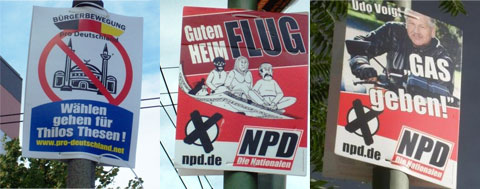
Coverage of the Berlin state election has concentrated on the remarkable rise of the Pirate Party, which won 8.5% of the vote and 15 seats in the state parliament. But it also worth taking time to celebrate the disastrous results for parties of the Islamophobic far right, who gained publicity during the election campaign with their provocative political posters but failed to attract the voters.
They didn’t win a single seat in the state parliament and the best any of them did was the 2.2% of the vote gained by the Nationaldemokratische Partei Deutschlands, a more traditionally neo-Nazi party that did have the advantage of an established organisation and name recognition. Bürgerbewegung pro Deutschland, which is associated with the Austrian Freedom Party, got only 1.2%. And René Stadtkewitz’s Die Freiheit, whose founding conference was attended by Daniel Pipes and whose election campaign enjoyed the public backing of Geert Wilders, got less than 1%.
Pro Deutchland will no doubt take consolation from the fact that their main support lies in Cologne. But given that Stadtkewitz’s own political base was in Berlin, the humiliating wipe-out his party has suffered there surely indicates that it has no political future. A statement on the Freiheit website co-signed by Stadtkewitz tries to remain upbeat, claiming that the disillusioned 40% of the electorate who did not vote can still be won to his party’s Islamophobic, Eurosceptic programme. But Die Freiheit is clearly dead in the water.
As the popularity of Thilo Sarrazin’s notorious book Deutschland schafft sich ab indicates, there is a substantial section of the German people who are receptive to anti-Muslim propaganda. But so far, thankfully, no party of the extreme right in Germany has been able to translate that into significant electoral support.
